The entertainment industry runs on relationships. Your talent might get you in the door, but your behavior keeps you there. I’ve seen incredibly gifted actors struggle to find work because of their reputation on set. Meanwhile, actors with decent skills but great attitudes get hired over and over again.
Here’s the truth: casting directors talk. Producers share notes. Directors remember how you made them feel during production. Your on-set etiquette matters more than you might think. It’s the difference between a one-time gig and a thriving career.
This guide breaks down the professional behaviors that make industry professionals want to work with you repeatedly. These aren’t just nice-to-have soft skills. They’re career-building essentials that separate working actors from struggling ones.
Understanding the Hierarchy and Chain of Command
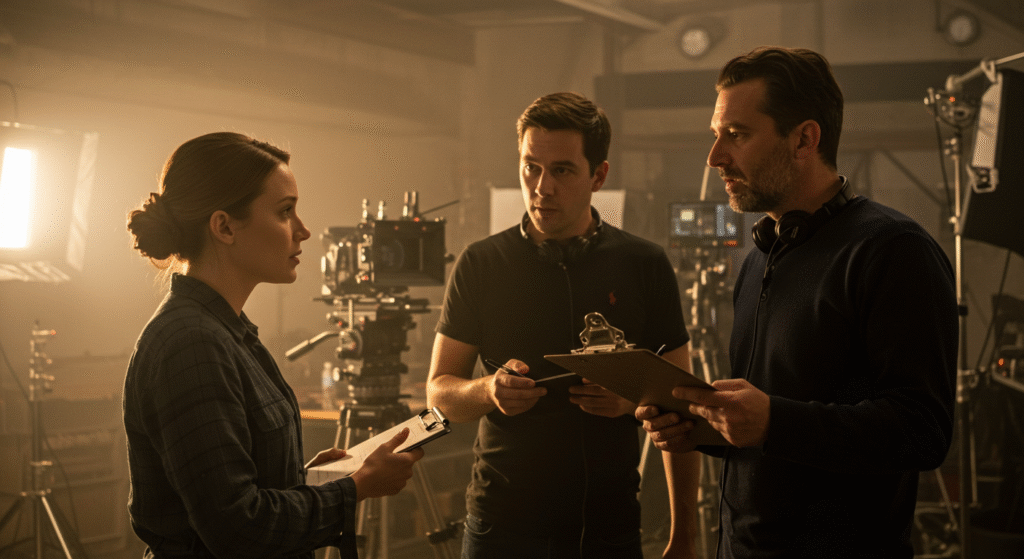
Every film set has a pecking order. Understanding it shows you’re a pro who gets how the business works. The director makes creative decisions and guides your performance. Assistant directors handle the daily grind of scheduling and logistics. Producers deal with money and business stuff.
Don’t go straight to the director with questions about call times. That’s what assistant directors are for. Need to discuss a costume issue? Talk to the costume department head first. This isn’t about being stuffy. It’s about respecting everyone’s role and keeping things running smoothly.
When you bypass the chain of command, you create chaos. You also show that you don’t understand professional film production. That’s not the impression you want to make if you’re hoping for future work.
Key Hierarchy Guidelines: • Talk to the director about performance and character choices • Ask assistant directors about schedules and logistics • Address costume or makeup issues through department heads • Never jump the chain unless it’s a safety or harassment issue • Wait for introductions rather than inserting yourself into conversations • Remember that first ADs run the day-to-day operations • Understand that producers handle business while directors handle creativity
Punctuality and Time Management Excellence
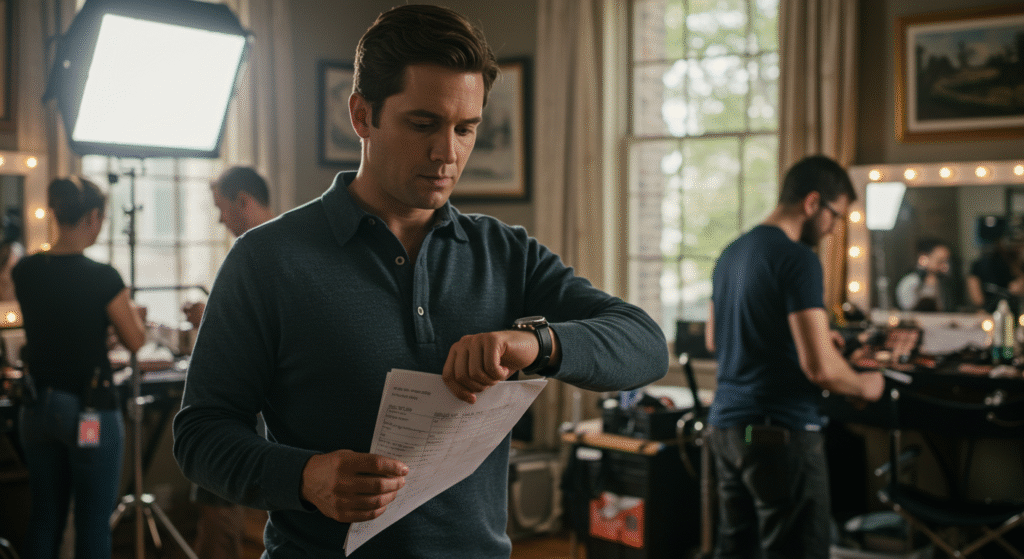
Showing up late affects everyone’s day. Film crews work long hours and tight schedules. When you’re late, dozens of people sit around waiting. That costs money and creates stress for everyone involved.
Professional actors arrive 15-30 minutes early. This gives you time to get into costume and makeup without rushing. It also shows respect for everyone else’s time. More importantly, it demonstrates that you take the job seriously.
But punctuality goes beyond just showing up on time. Come prepared with your lines memorized. Stay ready throughout long shooting days. Be flexible when schedules change, because they always do in film production.
Time Management Best Practices: • Arrive 15-30 minutes before your call time • Have lines completely memorized before arriving • Tell production about any schedule conflicts immediately • Stay physically and vocally ready during long days • Prepare for weather delays and schedule changes • Use downtime for line review or character work • Never book personal appointments that might conflict • Accept that film schedules change constantly
Communication Skills and Professional Interaction
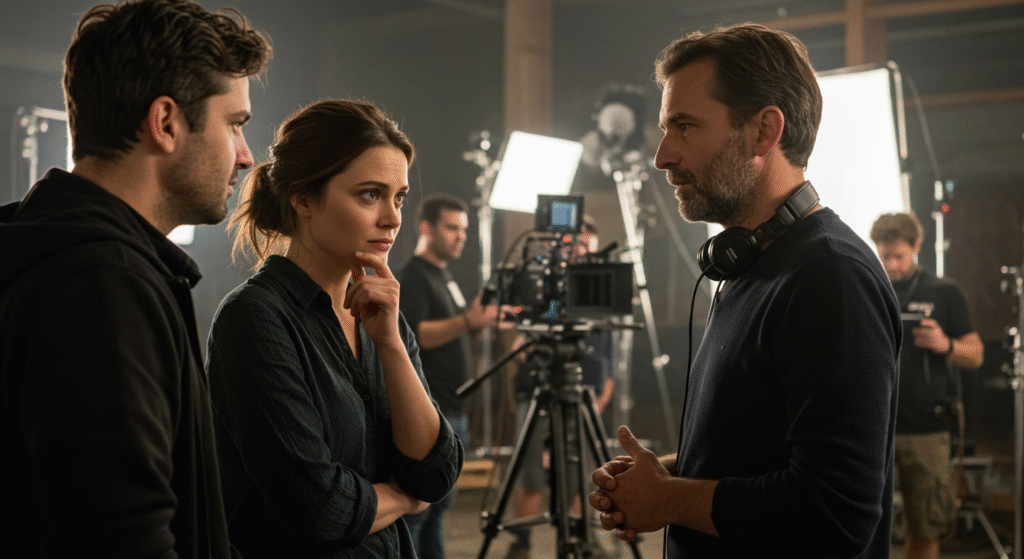
Good communication on set means knowing when to speak up and when to listen. Film sets require focused collaboration, not casual chatting. When you discuss scenes, be clear and concise. Have your thoughts organized before you speak.
Stay open to direction and alternative approaches. The best actors communicate their ideas while remaining flexible. They listen more than they talk. They ask thoughtful questions that show they’ve done their homework.
Treat everyone with equal respect. The grip who moves equipment might work on your next project too. The craft services person might have a friend who’s a casting director. Every relationship matters in this industry.
Communication Excellence Tips: • Speak clearly when discussing scenes or asking questions • Listen to direction without interrupting or arguing • Address crew members by name and appreciate their work • Ask questions that show preparation and engagement • Avoid gossip about other productions or professionals • Keep your voice at appropriate levels for the working environment • Practice active listening to understand direction fully • Stay friendly but maintain professional boundaries
Preparation and Professionalism Standards
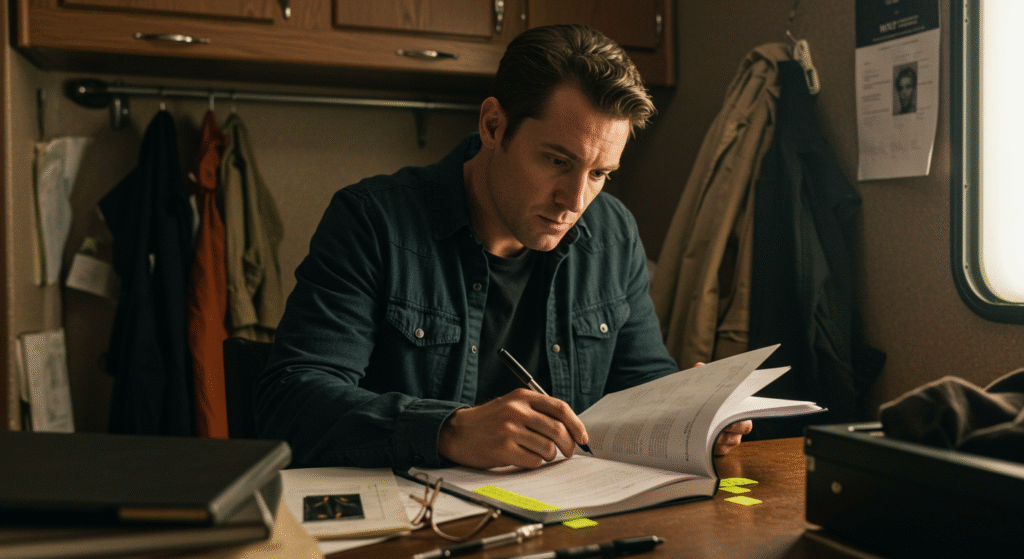
Preparation goes way beyond memorizing lines. Professional actors understand their character’s journey through the entire script. They know their objectives in each scene. They’ve researched the project’s background and their character’s world.
Show up ready to make bold choices while staying flexible to direction. This means having multiple ways to play each scene. It means understanding how your character fits into the bigger story. Directors love actors who come prepared with ideas but don’t get precious about them.
Physical preparation matters too. Maintain the look you had during casting. Practice any required skills or accents beforehand. If your character needs specific abilities, develop them before production starts. This lets directors focus on performance instead of teaching basics.
Professional Preparation Checklist: • Memorize all lines before each shooting day • Research your character’s background and motivations thoroughly • Practice required accents, skills, or physical abilities • Maintain your agreed-upon appearance throughout production • Understand the script’s overall story and your character’s arc • Prepare multiple interpretation options for scenes • Have specific objectives and tactics ready for your character • Stay current with script changes and revisions • Bring personal necessities like water and snacks
Collaborative Spirit and Team Dynamics

Filmmaking is teamwork. The most successful actors understand this completely. They support their scene partners. They stay flexible when things change. They contribute to a positive creative atmosphere where everyone can do their best work.
Being collaborative means staying engaged during other actors’ close-ups. It means helping create an environment where everyone feels comfortable taking risks. It means having a problem-solving attitude when challenges arise.
Think beyond just your own performance. Understand how your choices affect the camera department, the editor, and other actors. This awareness makes you a valuable team player instead of just another performer demanding attention.
Collaborative Excellence Practices: • Stay engaged during other actors’ coverage and off-camera lines • Remain positive when scenes or directions change unexpectedly • Offer suggestions while staying open to alternatives • Help maintain good energy during difficult or long days • Understand how your performance affects other departments • Share the spotlight and celebrate others’ successes • Jump in to help solve problems when they arise • Keep your performance consistent to help other departments plan
Managing Downtime and Set Behavior

Film sets involve lots of waiting. Between lighting setups, during equipment moves, while other scenes shoot. How you handle this downtime shows your professionalism. Use the time productively for line review or character work.
Respect the working atmosphere even during breaks. Keep conversations quiet. Stay in designated areas. Remain alert for sudden schedule changes. Film production moves fast when it moves, and you need to be ready.
Manage your energy throughout long days. Eat regularly. Stay hydrated. Take care of personal needs during appropriate breaks. Your job is to be ready to deliver great work whenever they call for you.
Downtime Management Guidelines: • Use quiet time for line review or character preparation • Respect designated areas for actors versus crew workspace • Keep conversations at low volumes • Stay alert for sudden call times or schedule changes • Avoid activities that might damage costumes or makeup • Bring quiet personal entertainment like books or tablets with headphones • Handle meals and personal needs efficiently during breaks • Maintain professional appearance even during long waits • Respect others’ need for quiet preparation time
Technology and Social Media Boundaries
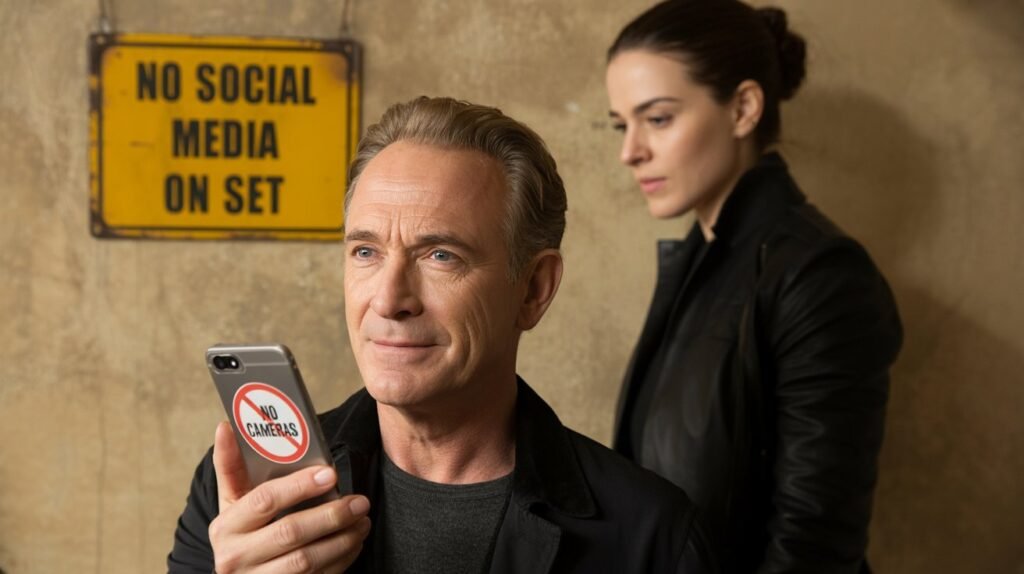
Most productions have strict rules about phones and social media. Respect them completely. No photos or videos on set without permission. No posting about plot details or production schedules. These rules protect both creative content and everyone’s privacy.
Keep your phone on silent. Use it discreetly during appropriate times only. Some productions ban personal devices entirely during filming. Check the rules and follow them exactly. This shows you can be trusted with confidential information.
Social media policies go beyond just photos. Don’t discuss plot points, character details, or production schedules online. Check with production before posting anything project-related, even innocent behind-the-scenes shots or cast appreciation posts.
Digital and Social Media Etiquette: • Never photograph or record on set without explicit permission • Respect all confidentiality agreements about plot and characters • Check with production before posting any project-related content • Keep personal devices silent and use them appropriately • Avoid sharing production schedules, locations, or insider information • Understand that some productions prohibit device use during filming • Respect others’ privacy and avoid tagging without permission • Wait for official announcements before confirming your involvement
Handling Conflicts and Difficult Situations
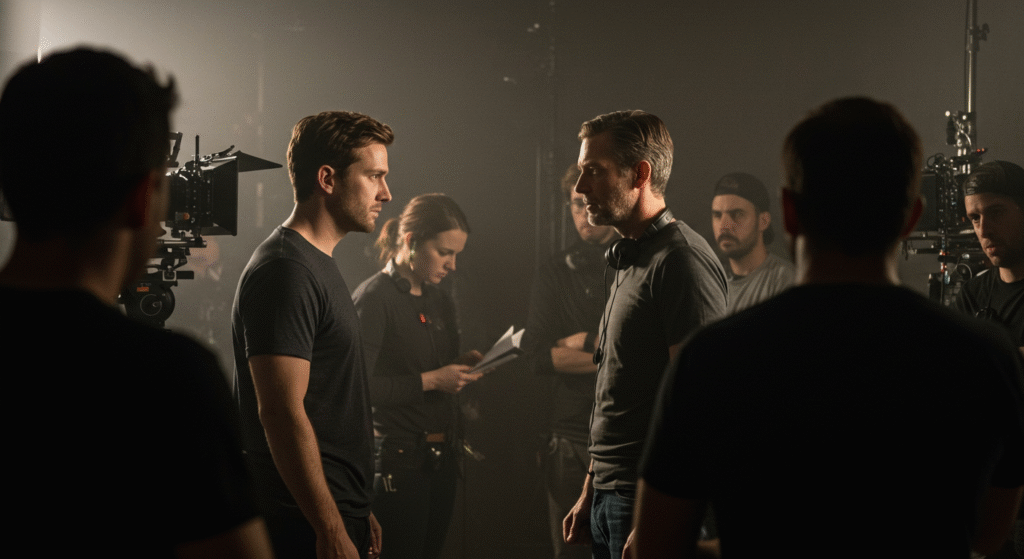
Every production has challenges. Creative disagreements happen. Personality conflicts arise. Technical problems create stress. How you handle these situations defines your reputation more than your performance in easy scenes.
When creative differences come up, express your concerns respectfully. Offer alternative suggestions. Stay open to compromise while keeping the project’s best interests in mind. Address issues privately when possible instead of creating drama in front of the crew.
Maintain your composure under pressure. Treat everyone with respect regardless of their behavior toward you. Focus on solutions rather than blame. When serious issues arise that you can’t resolve directly, use proper channels to escalate concerns.
Conflict Resolution Strategies: • Address creative disagreements respectfully and privately • Focus on the work rather than personal issues • Seek solutions instead of dwelling on problems • Use proper channels for serious concerns • Stay professional even when others don’t • Document serious issues while working toward resolution • Keep the project’s success as your primary focus • Know when to involve agents, union reps, or production management
Building Long-term Professional Relationships

The entertainment industry is smaller than you think. The assistant director on your indie film might produce a studio movie next year. The script supervisor might recommend you for their next project. Every relationship matters for your career.
Build these relationships through consistent professional behavior on every project. Size and budget don’t matter. Treat student films with the same professionalism as major studio productions. Your reputation spreads through every level of the industry.
Stay connected appropriately between projects. Congratulate colleagues on their successes. Support their work when you can. Maintain relationships with casting directors and agents. But do this through genuine professional respect, not aggressive networking.
Relationship Building Principles: • Maintain consistent professionalism on all projects regardless of size • Stay appropriately connected with industry professionals between jobs • Celebrate others’ successes genuinely • Remember names and personal details of crew and fellow professionals • Help others when appropriate and within your capability • Keep personal information shared by colleagues confidential • Build relationships through excellent work, not aggressive networking • Show appreciation and express gratitude professionally • Support colleagues’ projects when possible
Safety and Set Protocols
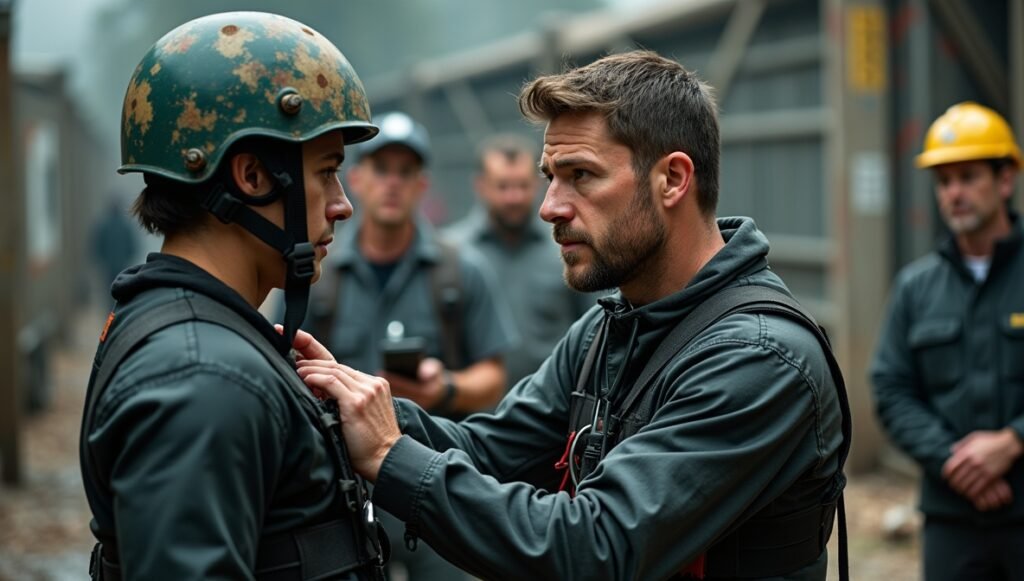
Film sets use complex equipment and potentially dangerous effects. Safety protocols exist for good reasons. Take all safety briefings seriously. Ask questions about unfamiliar procedures. Never try to shortcut safety measures for convenience or creative reasons.
This includes being honest about your physical abilities and limitations. Don’t attempt stunts outside your training. Communicate health concerns that might affect your work. Arrive on set in condition to perform safely every day.
Safety consciousness extends to personal wellness too. Maintain your physical and mental health throughout production. Avoid substances that might impair your judgment. Take care of health needs that could impact the production schedule.
Safety and Protocol Guidelines: • Attend all safety briefings and ask questions about procedures • Never attempt stunts or technical work outside your authorization • Communicate honestly about physical limitations or health issues • Maintain sobriety and clear judgment during production days • Report safety hazards immediately to appropriate personnel • Follow all health protocols established by production • Understand emergency procedures for all locations • Respect boundaries around technical equipment • Take responsibility for personal health and wellness
Professional Growth and Continuous Improvement

Approach every project as a learning opportunity. Seek feedback constructively. Watch how successful actors handle themselves professionally. Continuously refine both your craft skills and professional behavior.
The industry changes constantly. Technology evolves. Professional standards shift. Stay current through ongoing education and training. Take classes. Attend workshops. Work with coaches who can help develop both artistic and professional capabilities.
Honest self-assessment helps you grow. Identify areas where you need improvement. Maybe your time management needs work. Perhaps your communication skills could be better. Invest in developing these professional capabilities between projects.
Professional Development Strategies: • Seek constructive feedback from directors and trusted colleagues • Observe successful actors’ professional practices on set • Invest in ongoing training between projects • Stay current with industry trends and professional standards • Practice honest self-reflection about strengths and weaknesses • Take classes addressing both artistic and professional skills • Network professionally at industry events and educational opportunities • Maintain appropriate physical and vocal fitness • Read industry publications and stay informed about business developments
Conclusion
Professional behavior on set goes far beyond knowing your lines and hitting your marks. It’s about respecting the collaborative art of filmmaking and the business that makes it possible. Actors who master these professional standards build careers on reputation and relationships that last decades.
The entertainment industry values actors who bring skill, creativity, and professionalism to every project. Directors and producers actively seek performers who make productions run smoothly and enjoyably. When you demonstrate these professional qualities consistently, you become the kind of actor people want to hire again and again.
Remember that every interaction contributes to your professional reputation. Every project matters, regardless of its size or budget. The investment you make in professional behavior pays dividends throughout your career, opening doors to opportunities that might never come to equally talented but less professional performers.
In an industry where talent is abundant, professionalism becomes the factor that separates working actors from struggling ones. Master these behaviors, and you’ll transform from someone who occasionally gets hired into someone who gets called back repeatedly. That’s the difference between having a career and just booking jobs.

